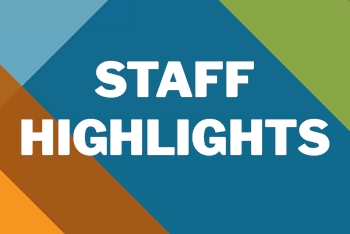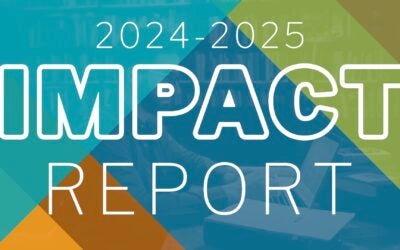In a political landscape marked by division and rapid change, policy work remains an essential yet challenging field.
In our latest episode of Into the Fold we’re taking a closer look at the mental health policy field in Texas. We speak with Alison Mohr Boleware, LMSW, director of policy at the Hogg Foundation, and Lyssette Galvan, policy director for National Alliance on Mental Illness Texas (NAMI), who share their insights on navigating the challenges and complexities of their work.
Finding Purpose Amidst Challenges
For Alison and Lyssette, personal experiences inspired their entry into policymaking. Alison recalls her frustration during her social work internship, watching families struggle to access essential services due to restrictive eligibility rules.
“That made me go into policy work,” says Alison, emphasizing her passion for systemic solutions rather than quick fixes.
Similarly, Lyssette’s journey began as a teacher advocating for a social worker on campus.
“Thinking about the change we can make for future generations is really what pushes me every day,” Lyssette says.
Their stories underscore how real-world frustrations often fuel the drive to create lasting change.
Strategies for Resilience
Policy work is not without its stresses, however, particularly during election years when divisive rhetoric and information overload can feel overwhelming. Alison and Lyssette emphasize the importance of boundaries and mindfulness. Alison, for instance, deliberately avoids social media during the election season, citing its impact on her mental health.
“I try to focus on what I can control,” says Alison, like discussing mental health issues and engaging in actionable work.
Lyssette agrees, adding that limiting social media and practicing mindfulness are critical strategies for managing stress.
“Our algorithms drive so much of what we see. Setting time limits has been a game-changer for me,” says Lyssette.
Building a Culture of Advocacy
Alison and Lyssette emphasize the value of empowering others to participate in advocacy. Lysette highlights NAMI Texas’s SMARTS for Advocacy program, which teaches individuals to tell their stories effectively and engage with policymakers.
“It’s beautiful to see people feel empowered and ready to advocate for systemic changes,” says Lyssette.
Alison echoes the importance of making advocacy accessible. She stresses the value of connecting with existing coalitions and organizations rather than starting from scratch.
“Most issues already have groups working on them,” says Alison. “Legislators have limited time, so coming in with clear recommendations is key.”
Celebrating Wins and Looking Forward
Despite the challenges, both Alison and Lyssette find motivation in small victories. Alison shares a recent example where advocacy led to expanding a grant program for youth mental health services from serving children under 13 years to including those up to 18.
“That’s a win,” Alison says, emphasizing the tangible impact of sustained advocacy.
Looking ahead, Lyssette expresses excitement about expanding NAMI Texas’s resources, including translating advocacy materials into more languages to engage diverse communities.
“It’s critical for underserved populations to have their voices heard,” says Lyssette.
For those inspired to get involved, resources like the Hogg Foundation’s Mental Health Guide and NAMI Texas’s SMARTS for Advocacy provide accessible entry points to engage in meaningful policy change.
Arts and Humanities Research Grants for Early Career Faculty
This initiative’s goal is to produce and publish research findings of scholarly works investigating the interface of mental health, well-being, and the arts and humanities.
Mutual Aid, Mutual Respect
In this episode of Into the Fold, we speak with Dawn Capra, Director of Housing Advocacy at the Texas Housing Foundation. She describes how well-coordinated and respectful cooperation between community organizations supported both the logistical needs and emotional well-being of displaced residents.
December 2025 Staff Highlights
Here’s a snapshot of the presentations made, events hosted, and honors received by the talented and dedicated staff of the Hogg Foundation during the month of December 2025.
November 2025 Staff Highlights
Here’s a snapshot of the presentations made, events hosted, and honors received by the talented and dedicated staff of the Hogg Foundation during the month of November 2025.
Let Community Drive the Work: A Conversation with Larissa Minner
In this episode of the podcast, Larissa Minner, a researcher at the Texas Center for Disability Studies at the University of Texas School of Social Work and director of the Weaving Inclusion Together in research Hub (WITH), joins us for an exploration of how small-scale changes to everyday practice can catalyze deeper change not only to lives, but to systems.
Impact Report 2025
A glimpse into the previous year’s work of the premier Texas mental health funder and the individuals and organizations who contribute to our success.





